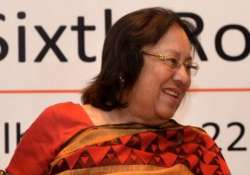2015 was a hectic year for Minority Affairs Ministry
New Delhi: With issues like Dadri lynching and row over beef eating kicking up a political storm in 2015, Minority Affairs Ministry had to act as fire fighter for the NDA government in addition to

New Delhi: With issues like Dadri lynching and row over beef eating kicking up a political storm in 2015, Minority Affairs Ministry had to act as fire fighter for the NDA government in addition to envisaging welfare schemes for minority communities.
During the year, the ministry came up with some new programmes aimed at providing skill-based training to youth from minorities, restructuring educational institutes and bringing in transparency the way in which scholarship funds were distributed to children from the six communities—Muslims, Christians, Buddhists, Sikhs, Parsis and Jains.
Allegations of “growing intolerance” by renowned authors and the intelligentsia against the government and the ‘award wapasi' campaign pushed the ministry into a damage control mode, holding conferences and meetings with stakeholders concerned and interacting with the media to assure communities about the government's commitment to peace.
The year saw the government approving doubling of authorised share capital of National Minorities Development and Finance Corporation, a Central Sector Public Enterprise in the ministry to Rs 3,000 crore.
In the 2015-16 budget, the government announced launching of an integrated education and livelihood initiative ‘Nai Manzil' for the benefit of minority youths who do not have a formal school leaving certificate, enabling them to seek better employment in organised sector.
The scheme, launched by Minister Najma Heptulla on August 10, seeks to provide bridge courses to madrassa-educated youth to enable them to pursue higher education.
The government recently approved Rs 650 crore for the scheme. The pre-matric, post-matric and merit-cum-means scholarship schemes that aim at educational empowerment of minorities were operationalised on National Scholarship Portal (NSP) from July.
Wherever available, bank accounts are being linked with Aadhaar number for direct benefit transfer (DBT) of scholarships.
Under the ‘Seekho aur Kamao' (Learn and Earn), a placement linked skill development programme for minorities, the ministry started an ambitious plan to train 1.13 lakh beneficiaries in the year, with budgetary allocation of Rs 192.45 crore.
During 2015-16, the ministry sanctioned 73 hostels with proper toilet facilities and 52 toilets and drinking water projects in other schools under its Multi-sectoral Development Programme.
On October 31, the government also approved projects for imparting digital literacy to 3,71,657 students in West Bengal, Uttar Pradesh, Tripura and Rajasthan under ‘Cyber Gram'.
In order to highlight, preserve and showcase “rich” cultural heritage of minority communities, a new scheme ‘Hamari Dharohar' was launched to support iconic exhibitions, supporting calligraphy and related crafts, and research and development.
USTTAD (Upgrading the Skills and Training in Traditional Arts/Crafts for Development) was another scheme the government launched in May to preserve heritage of traditional arts/ crafts of minorities and build capacity of traditional artisans/craftsmen.
Funded by Centre, the scheme is aimed at preparing skilled and unskilled artisans and craftsmen to compete with big companies, establishing linkages of traditional arts/crafts with national and international markets and ensure dignity of labour.
The ministry inaugurated a new Central Waqf Bhawan building with the expectation that this would emerge as the epicenter of Waqf management in the country and provide greater support to the state Waqf boards for their effective functioning.
A decision to restructure Maulana Azad Education Foundation, an autonomous body floated in 1989, was also taken this year. The government asked Tata Institute of Social Sciences to give a report on the restructuring to a “professionally relevant” think tank for promotion of education among minority communities.
The ministry also launched online application management system this year to bring in quick delivery and ensure transparency in release of funds for ‘Nai Roshni' scheme meant for leadership development of minority women.
A programme for skill training centres for madrassa students was also launched. It involves linking of traditional educational institutions like madrassas, maktabs, monasteries and others, with skill training for the minority communities.